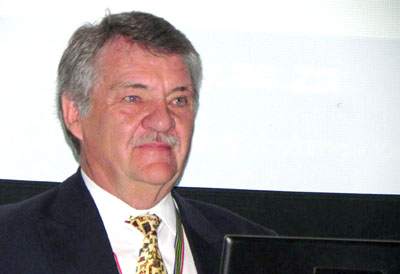Latest News Archive
Please select Category, Year, and then Month to display items
06 November 2023
|
Story MBALI MABOEA
|
Photo SUPPLIED
 The Department of Geography on the UFS Qwaqwa Campus recently played host to the Society of South African Geographers Conference (SSAG 2023), which gathered more than 100 students over three days.
The Department of Geography on the UFS Qwaqwa Campus recently played host to the Society of South African Geographers Conference (SSAG 2023), which gathered more than 100 students over three days.
Fostering academic growth, collaboration, and inspiration among students and researchers in the field of geography, the Department of Geography on the UFS Qwaqwa Campus recently played host to the Society of South African Geographers Conference (SSAG 2023), which gathered more than 100 students over three days.
Following a five-year hiatus, the three-day conference comprised student proposal presentations in different fields: human geography, environment geography, geoinformatics, and physical geography, divided into breakaway sessions over two days. Furthermore, day three of the annual conference included an excursion to the Basotho Cultural Village and Clarens.
The three-day annual student conference focused on different themes presented by two main speakers. The topic of the first keynote speaker, Dr Mahlomola Daemane, General Manager of the SANParks Arid Research Unit, focused on the contemporary conservation, transition, and relevance of science in policy and decision making.
The second keynote speaker was Dr Felicia Akinyemi, a Marie Sklodowska-Curie Research Fellow affiliated with the Institute of Geography at the University of Bern in Switzerland. Her work focuses on the intersection of geoinformatics, global change, and sustainability. Dr Akinyemi focused her talk on the integrative geospatial methods and metrics for sustainable land use. She introduced different techniques and metrics and gave students insight in early-career African research.
Speaking about the success of the conference, Nthebohiseng Sekhele, Geography Lecturer on the Qwaqwa Campus and chair of the organising committee, said, “The local organising committee was also very impressed with the quality of presentations from our postgraduate students in Geography, as well as the robust discussions that happened during the parallel sessions in the two days of the conference. We had a positive response of physical and online participation from many universities across South Africa. We are pleased that we have achieved our goal with this conference, which is to inspire the next generation of geographers.”
Prof. Johan Grobbelaar part of history
2010-09-23
 |
|
Prof. Johan Grobbelaar from the Department of Plant Sciences at the recent 31st Congress of the International Limnological Society (SIL), which was held in Cape Town.
Photo: Supplied
|
The 31st Congress of the International Limnological Society (SIL) was recently held at the Cape Town International Convention Centre (CTICC).
Prof. Johan Grobbelaar from the Department of Plant Sciences at the University of the Free State (UFS), who is also the chairperson of the local organising committee (LOC), worked hard for six years to secure the bid to host the congress in South Africa. The LOC consisted of Prof. Grobbelaar, Prof. Brian Allanson, Prof. Jenny Day, Dr Carin van Ginkel and Dr Mike Silberbauer.
SIL was founded in 1922 to further the study and understanding of all aspects of limnology, the science of inland aquatic ecosystems and their management.
Congresses are held every three years and this was the first time that SIL met on the African continent.
Almost 400 delegates from 42 countries attended this congress where the state of the science of limnology was presented with two keynote speakers, six plenary lectures, 230 oral and 76 poster presentations, mostly running in five parallel sessions. Exhibitions displayed some of South Africa’s role players as well as the latest equipment from abroad. Delegates could also join pre- and post-congress excursions and the new SIL journal, Inland Waters, was launched at the congress.
Many of the presentations dealt with water as a limited resource, pollution problems and the impact of climate change. The congress resolved that SIL would play a more prominent role in creating awareness of problems impacting on inland waters and also afforded solutions. The 32nd SIL congress will be held in Budapest, Hungary in 2013.